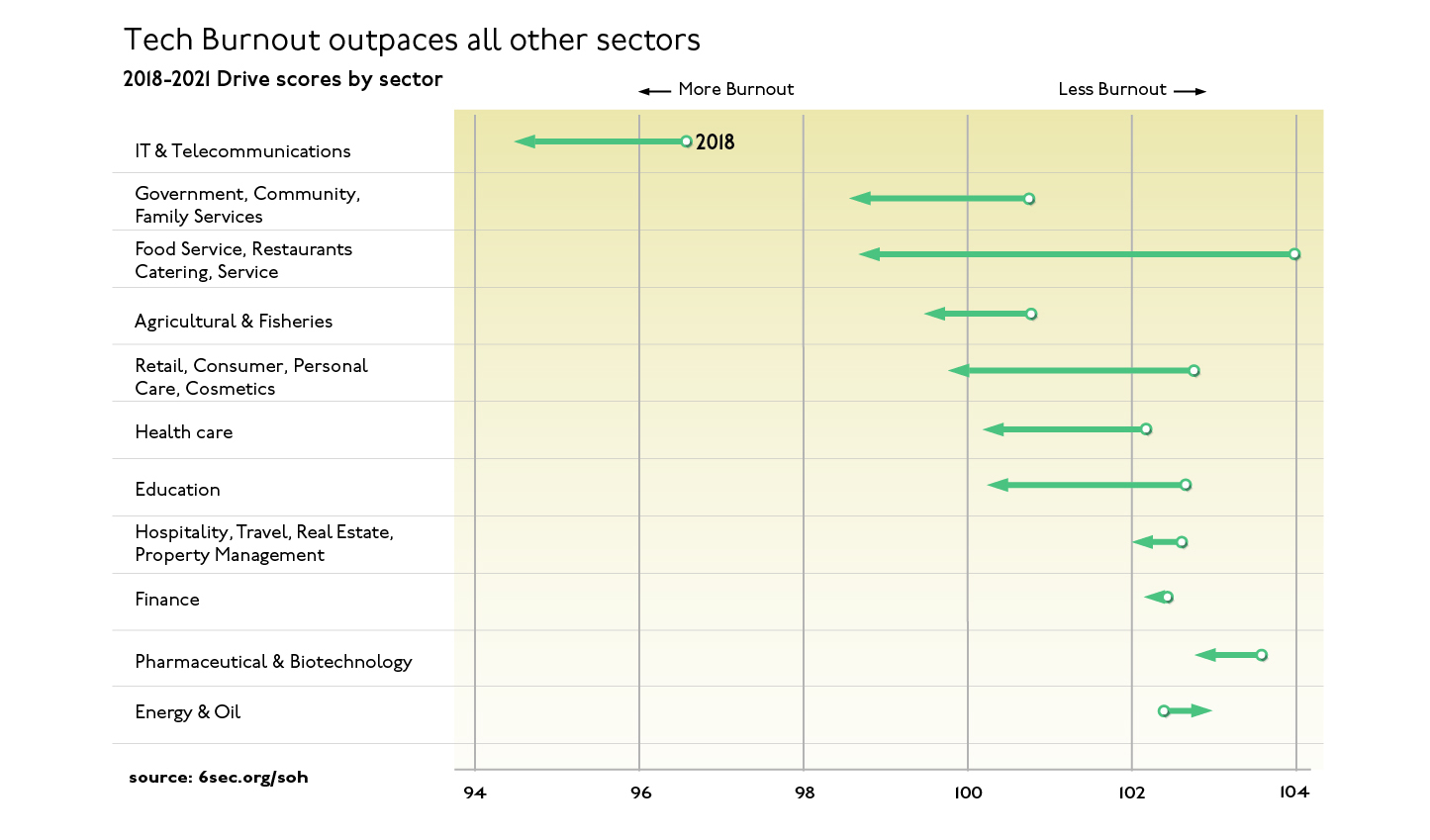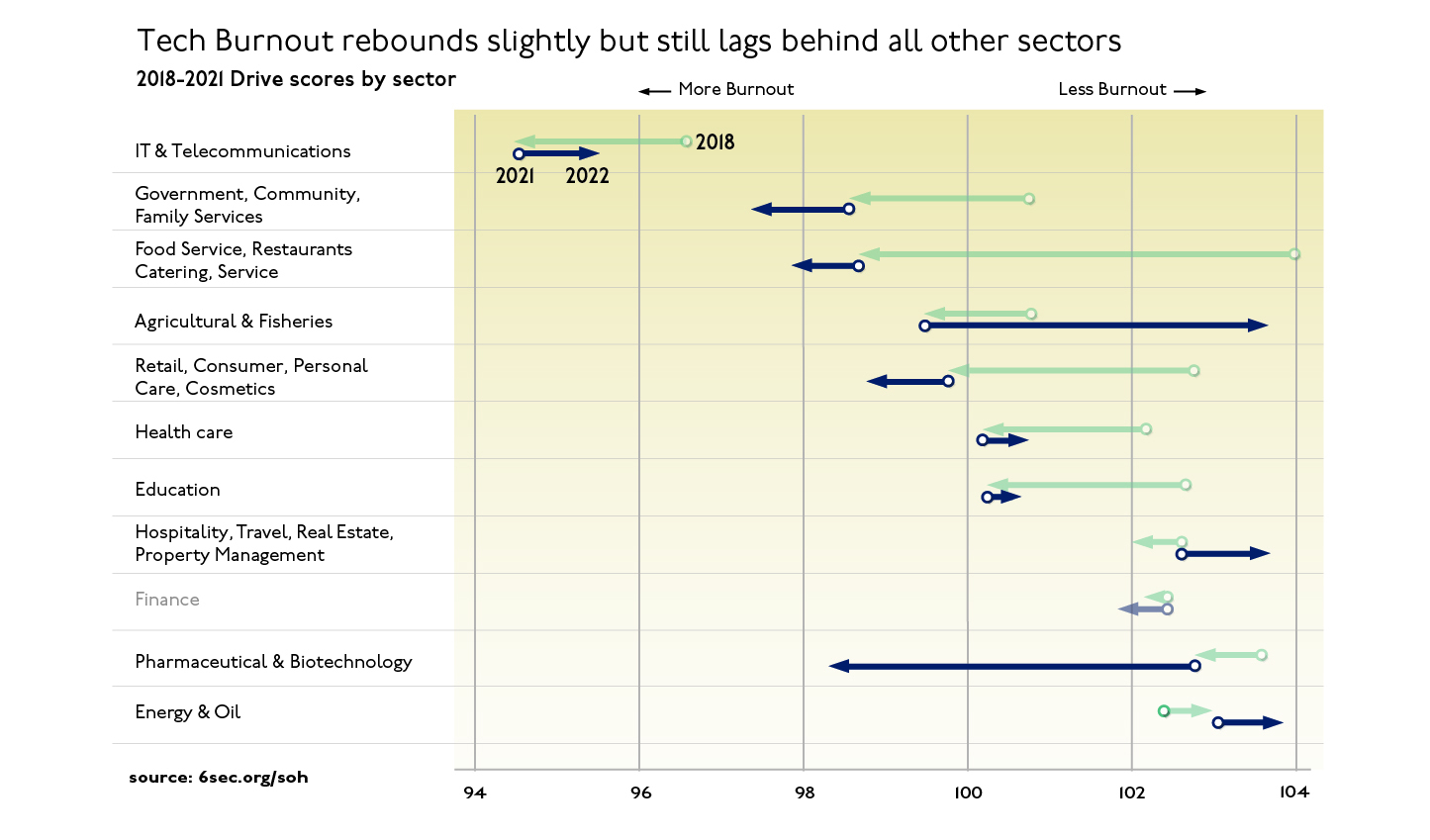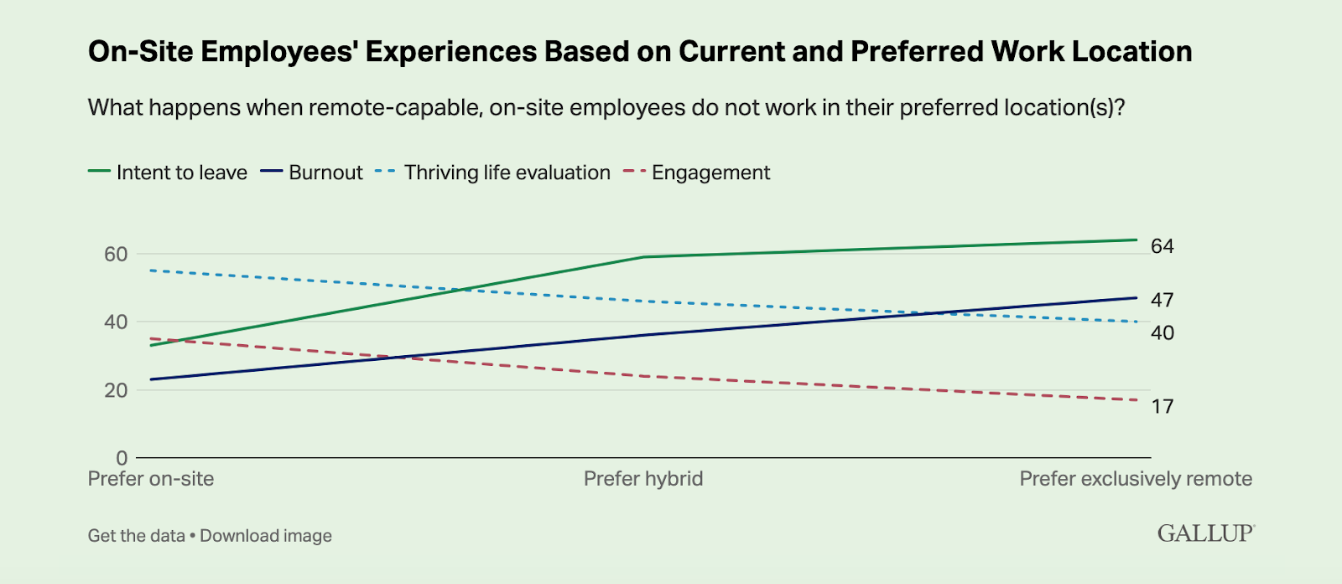Tech Industry Gambles with Return-to-Office Mandates for Struggling Workforce
New research from the world’s largest study of emotional intelligence finds tech burnout far outpacing other sectors. Tech CEOs are doubling down on return-to-office mandates anyway.
By Michael Miller

In spite of data indicating that return-to-office mandates lower engagement and increase burnout – two persistent issues in the tech industry already – tech leaders keep announcing them. At Google, Apple, Amazon, Meta, Salesforce and more, the C-suite has told employees to come back to the office or else.<\/p>\n
Will this gamble pay off, or exacerbate existing problems with trust and burnout?<\/p>\n
Let\u2019s start by understanding the context in which the RTO mandates are happening.<\/p>\n
<\/p>\n
Tech workers burnt out and unhappy<\/strong><\/span><\/p>\n The world is experiencing an epidemic of burnout, and it\u2019s particularly acute among young people and tech workers<\/a>, according to recently published research from the world\u2019s largest study of emotional intelligence.<\/p>\n Here\u2019s a graph of burnout from 2018 to 2021, by workplace sector:<\/p>","tablet":" Tech has a burnout problem - and it may be about to get worse.<\/p>\n In spite of data indicating that return-to-office mandates lower engagement and increase burnout - two persistent issues in the tech industry already - tech leaders keep announcing them. At Google, Apple, Amazon, Meta, Salesforce and more, the C-suite has told employees to come back to the office or else.<\/p>\n Will this gamble pay off, or exacerbate existing problems with trust and burnout?<\/p>\n Let\u2019s start by understanding the context in which the RTO mandates are happening.<\/p>\n\n Tech workers burnt out and unhappy<\/strong><\/span><\/p>\n The world is experiencing an epidemic of burnout, and it\u2019s particularly acute among young people and tech workers<\/a>, according to recently published research from the world\u2019s largest study of emotional intelligence.<\/p>\n Here\u2019s a graph of burnout from 2018 to 2021, by workplace sector:<\/p>"}},"slug":"et_pb_text"}" data-et-multi-view-load-tablet-hidden="true">
Tech has a burnout problem – and it may be about to get worse. In spite of data indicating that return-to-office mandates lower engagement and increase burnout – two persistent issues in the tech industry already – tech leaders keep announcing them. At Google, Apple, Amazon, Meta, Salesforce and more, the C-suite has told employees to come back to the office or else. Will this gamble pay off, or exacerbate existing problems with trust and burnout? Let’s start by understanding the context in which the RTO mandates are happening. Tech workers burnt out and unhappy The world is experiencing an epidemic of burnout, and it’s particularly acute among young people and tech workers, according to recently published research from the world’s largest study of emotional intelligence. Here’s a graph of burnout from 2018 to 2021, by workplace sector:
From 2021 to 2022, burnout in tech improved but still lags far behind every other sector in the study:
This was the situationbeforea rash of layoffs between late 2022 and mid-2023.
A new report from HR software company BambooHR corroborated these findings of tough times in tech: Employees in the tech industry recorded the sharpest decline in happiness over the past three years (-145%) of any sector.
The reality: Tech employees are struggling. Meanwhile…
Tech leaders order employees back to office<\/strong><\/span><\/p>\n Business Insider<\/em> put together a comprehensive list<\/a> of companies that had ordered employees back to the office. Some, like Salesforce, even reversed course on earlier promises that employees could “work from anywhere.”<\/p>\n Why are tech leaders taking the risk to issue return-to-office mandates in these circumstances?<\/p>\n The most commonly cited reason for mandating in person time is that it\u2019s better for company culture, collaboration and productivity. A whopping 81% of company leaders say coming back to the office next year will improve company culture and 83% say it will enhance productivity, according to a survey<\/a> sponsored by ResumeBuilder and conducted by Pollfish from Aug. 17-19.<\/p>\n The data, however, is mixed at best.<\/a> There are definitely benefits to in-person time, especially for younger workers, new employees and new teams. But the jury is out on whether employees are more productive or even collaborative in person. Amazon\u2019s CEO openly admitted they didn\u2019t have any data to support its return-to-office mandate, but pushed it through anyway. Tesla\u2019s Elon Musk pronounced that he\u2019s \u201ca big believer that people tend to be more productive when they\u2019re in person,\u201d without offering any evidence to support the claim.<\/p>\n Annie Dean, a flexible work advocate at Atlassian, a tech company who remains steadfastly committed to its \u201cwork from anywhere\u201d policy, joked in a viral LinkedIn post that these RTO mandates from mostly white, male, work-obsessed leaders are \u201cbased on a highly reliable source: their feelings.\u201d In many cases, that seems true.<\/p>\n Shifting economic conditions could also be playing a role. Dr. Grace Lordan, associate professor in behavioral science at the London School of Economics, told Business Insider that he sees CEOs simply taking advantage of a more business-friendly labor market: “Because the labor market is looser and there’s more talent to be hired, I think the employers think they’ll be able to get their way.”<\/p>\n But at what cost?<\/p>\n <\/p>","tablet":" Tech leaders order employees back to office<\/strong><\/span><\/p>\n Business Insider<\/em> put together a comprehensive list<\/a> of companies that had ordered employees back to the office. Some, like Salesforce, even reversed course on earlier promises that employees could \"work from anywhere.\"<\/p>\n Why are tech leaders taking the risk to issue return-to-office mandates in these circumstances?<\/p>\n The most commonly cited reason for mandating in person time is that it\u2019s better for company culture, collaboration and productivity. A whopping 81% of company leaders say coming back to the office next year will improve company culture and 83% say it will enhance productivity, according to a survey<\/a> sponsored by ResumeBuilder and conducted by Pollfish from Aug. 17-19.<\/p>\n The data, however, is mixed at best.<\/a> There are definitely benefits to in-person time, especially for younger workers, new employees and new teams. But the jury is out on whether employees are more productive or even collaborative in person. Amazon\u2019s CEO openly admitted they didn\u2019t have any data to support its return-to-office mandate, but pushed it through anyway. Tesla\u2019s Elon Musk pronounced that he\u2019s \u201ca big believer that people tend to be more productive when they\u2019re in person,\u201d without offering any evidence to support the claim.<\/p>\n Annie Dean, a flexible work advocate at Atlassian, a tech company who remains steadfastly committed to its \u201cwork from anywhere\u201d policy, joked in a viral LinkedIn post that these RTO mandates from mostly white, male, work-obsessed leaders are \u201cbased on a highly reliable source: their feelings.\u201d In many cases, that seems true.<\/p>\n Shifting economic conditions could also be playing a role. Dr. Grace Lordan, associate professor in behavioral science at the London School of Economics, told Business Insider that he sees CEOs simply taking advantage of a more business-friendly labor market: \"Because the labor market is looser and there's more talent to be hired, I think the employers think they'll be able to get their way.\"<\/p>\n But at what cost?<\/p>\n","phone":" Tech leaders order employees back to office<\/strong><\/span><\/p>\n Business Insider<\/em> put together a comprehensive list<\/a> of companies that had ordered employees back to the office. Some, like Salesforce, even reversed course on earlier promises that employees could \"work from anywhere.\"<\/p>\n Why are tech leaders taking the risk to issue return-to-office mandates in these circumstances?<\/p>\n The most commonly cited reason for mandating in person time is that it\u2019s better for company culture, collaboration and productivity. A whopping 81% of company leaders say coming back to the office next year will improve company culture and 83% say it will enhance productivity, according to a survey<\/a> sponsored by ResumeBuilder and conducted by Pollfish from Aug. 17-19.<\/p>\n The data, however, is mixed at best.<\/a> There are definitely benefits to in-person time, especially for younger workers, new employees and new teams. But the jury is out on whether employees are more productive or even collaborative in person. Amazon\u2019s CEO openly admitted they didn\u2019t have any data to support its return-to-office mandate, but pushed it through anyway. Tesla\u2019s Elon Musk pronounced that he\u2019s \u201ca big believer that people tend to be more productive when they\u2019re in person,\u201d without offering any evidence to support the claim.<\/p>\n Annie Dean, a flexible work advocate at Atlassian, a tech company who remains steadfastly committed to its \u201cwork from anywhere\u201d policy, joked in a viral LinkedIn post that these RTO mandates from mostly white, male, work-obsessed leaders are \u201cbased on a highly reliable source: their feelings.\u201d In many cases, that seems true.<\/p>\n Shifting economic conditions could also be playing a role. Dr. Grace Lordan, associate professor in behavioral science at the London School of Economics, told Business Insider that he sees CEOs simply taking advantage of a more business-friendly labor market: \"Because the labor market is looser and there's more talent to be hired, I think the employers think they'll be able to get their way.\"<\/p>\n But at what cost?<\/p>"}},"slug":"et_pb_text"}" data-et-multi-view-load-tablet-hidden="true" data-et-multi-view-load-phone-hidden="true">
Tech leaders order employees back to office 商业内幕put togethera comprehensive listof companies that had ordered employees back to the office. Some, like Salesforce, even reversed course on earlier promises that employees could “work from anywhere.” Why are tech leaders taking the risk to issue return-to-office mandates in these circumstances? 最经常被引用的原因要求在体育rson time is that it’s better for company culture, collaboration and productivity. A whopping 81% of company leaders say coming back to the office next year will improve company culture and 83% say it will enhance productivity, according to asurveysponsored by ResumeBuilder and conducted by Pollfish from Aug. 17-19. The data, however, ismixed at best.There are definitely benefits to in-person time, especially for younger workers, new employees and new teams. But the jury is out on whether employees are more productive or even collaborative in person. Amazon’s CEO openly admitted they didn’t have any data to support its return-to-office mandate, but pushed it through anyway. Tesla’s Elon Musk pronounced that he’s “a big believer that people tend to be more productive when they’re in person,” without offering any evidence to support the claim. Annie Dean, a flexible work advocate at Atlassian, a tech company who remains steadfastly committed to its “work from anywhere” policy, joked in a viral LinkedIn post that these RTO mandates from mostly white, male, work-obsessed leaders are “based on a highly reliable source: their feelings.” In many cases, that seems true. Shifting economic conditions could also be playing a role. Dr. Grace Lordan, associate professor in behavioral science at the London School of Economics, told Business Insider that he sees CEOs simply taking advantage of a more business-friendly labor market: “Because the labor market is looser and there’s more talent to be hired, I think the employers think they’ll be able to get their way.” But at what cost?
Meanwhile, the data is clear on the risks involved.<\/p>\n
Studies conducted before<\/a>, during<\/a> and after<\/a> the pandemic suggest that strict hybrid policies yield much less employee satisfaction than more flexible strategies, according to Raj Choudhury of Harvard Business School.<\/p>\n This low satisfaction has a real business cost.<\/p>\n Research from Gallup found that employees who don’t work in their preferred location have significantly lower employee engagement, alongside higher burnout and desire to quit.\u00a0<\/p>\n Check out this graph:<\/p>","tablet":" 'Employees will resist'<\/strong><\/span><\/p>\n Meanwhile, the data is clear on the risks involved.<\/p>\n Studies conducted before<\/a>, during<\/a> and after<\/a> the pandemic suggest that strict hybrid policies yield much less employee satisfaction than more flexible strategies, according to Raj Choudhury of Harvard Business School.<\/p>\n This low satisfaction has a real business cost.<\/p>\n Research from Gallup found that employees who don't work in their preferred location have significantly lower employee engagement, alongside higher burnout and desire to quit. <\/p>\n Check out this graph:<\/p>"}},"slug":"et_pb_text"}" data-et-multi-view-load-tablet-hidden="true">
‘Employees will resist’ Meanwhile, the data is clear on the risks involved. Studies conductedbefore,duringandafterthe pandemic suggest that strict hybrid policies yield much less employee satisfaction than more flexible strategies, according to Raj Choudhury of Harvard Business School. This low satisfaction has a real business cost. Research from Gallup found that employees who don’t work in their preferred location have significantly lower employee engagement, alongside higher burnout and desire to quit. Check out this graph:
For an industry already struggling with burnout and low engagement, this is a massive gamble.<\/p>\n
Time will tell how it plays out.<\/p>\n
<\/p>\n
Keep in tune with your employees – wherever they work\u00a0<\/strong><\/span><\/p>\n <\/p>","tablet":" \"Without a clear rationale, supported by data, and a plan to achieve those outcomes with more in person interaction, employees will resist,\" says Cali Williams Yost, CEO of Flex + Strategy Group, which helps companies adopt flexible work arrangements.<\/p>\n For an industry already struggling with burnout and low engagement, this is a massive gamble.<\/p>\n Time will tell how it plays out.<\/p>\n\n Keep in tune with your employees - wherever they work <\/strong><\/span><\/p>"}},"slug":"et_pb_text"}" data-et-multi-view-load-tablet-hidden="true">
“Without a clear rationale, supported by data, and a plan to achieve those outcomes with more in person interaction, employees will resist,” says Cali Williams Yost, CEO of Flex + Strategy Group, which helps companies adopt flexible work arrangements. For an industry already struggling with burnout and low engagement, this is a massive gamble. Time will tell how it plays out. Keep in tune with your employees – wherever they work
- Tech Is In Trouble: Will Return to Office Mandates Make it Even Worse?- September 20, 2023
- Emotional Intelligence at Work: Where Workers Are Struggling Most- September 20, 2023
- EQ Educator News: Where Have All the Students Gone?- September 13, 2023





